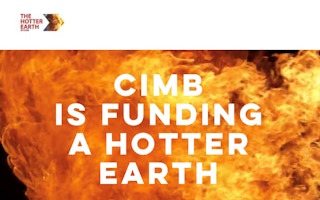In the week before CIMB stages a large sustainability event, the Malaysian bank has been targeted by Indonesian environmental campaigners for funding coal-fired power stations.
On 8 September, CIMB is to hold The Cooler Earth Sustainability Summit, an event running over eight weeks that will explore how to respond to climate change in the post-Covid era. Among the speakers are sustainability guru John Elkington and World Wide Fund for Nature (WWF) head Marco Lambertini.
A campaign by Indonesian non-government organisations Jatam, Walhi, Trend Asia and Greenpeace Indonesia has highlighted the irony of CIMB staging a sustainability event while it is funding coal projects in Java, calling the summit greenwash.
“CIMB is hosting the Cooler Earth Sustainability Summit to showcase its commitment to building a cleaner world. But there’s one horror twist: CIMB Group is also still funding climate-wrecking coal projects in Asia,” a parody website dubbed Hotter Earth reads.
The campaign points out that CIMB is part of the financing consortium for the Jawa 9 and 10 coal project in Indonesia. NGOs have projected that the 2,000-megawatt facility located 100km from Jakarta will kill 4,700 people prematurely from air pollution over its lifespan, and will be loss-making.
CIMB is Malaysia’s largest funder of coal power, pumping more than US$2.6 billion into coal projects over the last decade, campaign analysis showed. It also noted that Malaysian banks were falling behind a global trend among finance institutions to decarbonise, including Singapore’s banks, which all pledged to quit coal last year.
The NGOs said that funding coal goes against CIMB’s own sustainability commitments, as the bank signed up to the United Nations’ Principles on Responsble Banking, a framework that aligns lenders with the Paris climate agreement, in 2018.
Tata Mustasya, regional climate and energy campaign coordinator for Greenpeace Indonesia, said that CIMB could be a role model for Southeast Asia if it was to quit coal. “Malaysia is our negeri jiran (close neighbour). If CIMB steps up to tackle climate crisis, other banks will see it as a regional benchmark for responsible banking,” he said.
He added that construction of Jawa 9 and 10 would lock Indonesia into using coal until 2045, and experts have warned that coal needs to be phased out globally by 2040 to meet the Paris Agreement commitments to keep global warming below 1.5 degrees Celsius and prevent runaway climate change.
In a statement, CIMB said that it has committed to publicly disclose its sustainability targets and to align its portfolios to the goals of the Paris Agreement “within a set timeframe, for which we are on track.”
It said that was developing a guide for the coal sector “to ensure best practice” that would be launched by the end of 2020 or early 2021.
“We take a holistic approach in our financing decisions, carefully taking into consideration all key aspects including environmental protection, as well as the social and economic needs within our various markets,” the bank said.
CIMB noted that its sustainability journey started less than two years ago, and in that time the company had achieved a lot, including launching a sustainable financing policy, guidelines for sectors such as palm oil and oil and gas to adopt sustainability standards, and had risen up various sustainability rankings.
WWF is a knowledge partner of CIMB’s Cooler Earth Sustainability Summit. The NGO told Eco-Business that it believes in the transition to 100 per cent clean energy to stop climate change, “with coal completely phased out by 2050.”
“WWF believes that ceasing financing towards new coal-fired power plants should be the foundation of all banks’ coal policies,” the NGO said, adding “progressive discussions have taken place” with CIMB about phasing out coal.
“We believe our engagement has been constructive and in good faith, and we will meet their senior leadership to further our discussion,” WWF said.
Coal-fired power plants account for 40 per cent of global electricity production, but are responsible for more than 70 per cent of emissions from electricity. Coal is the single biggest contributer to man-made climate change.

















